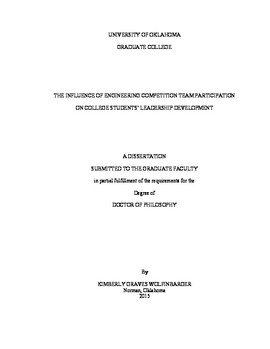| dc.description.abstract | Engineering competition teams are promoted as incubators for the development of leadership among college students, yet we know little about how leadership actually develops within the teams. This descriptive, instrumental case study of two engineering competition teams at a public university in the United States explored the influence of team participation on the leadership development of engineering students. The mixed-methods design included questionnaires and semi-structured interviews. During the first phase, members of the teams answered a questionnaire regarding the internal team environment, listed personally influential team members, and rated each listed member on personal influence and the extent to which the team relied on that member for leadership. Following the method of Carson et al. (2007), the social network measure of density was used to evaluate the level of shared leadership within each team. Individual-level social network measures were calculated to estimate the amount and type of influence exercised by individual team members, and to select candidates for the interviews. In the second phase, fourteen team members participated in individual recorded semi-structured interviews exploring the team experience and their own individual leadership development journeys. Interview transcripts were coded using both structured and inductive coding procedures.
Most team members’ definitions of leadership aligned with an individualistic, hierarchical view. A few team members’ definitions indicated an understanding of the nonpositional and collectivistic aspects of leadership. Further analysis revealed that team members understood leadership from a functional perspective. Team members strongly associated five categories of behavior with leadership: Ideal Behavior, Individual Consideration, Project Management, Technical Competence, and Communication. Other leadership behaviors, including Collaboration, Training & Mentoring, Problem-Solving, Motivating Others, Delegation, and Boundary-Spanning, were less consistently recognized, and some behaviors were valued more highly within one team than the other. ECT participation helped students further their technical, relational, and project-management skills. The interviews also revealed considerable room for improvement. Team members struggled to manage their projects, failed to document important information, and overemphasized ideal behavior as the key to project success. The team members interviewed exhibited the full range of collegiate leadership identities described by the Leadership Identity Development (LID) model (Komives et al., 2005, 2006). Positional leadership role experience (within ECT or other organizations) did not positively predict a student’s level of leadership identity development. Students’ leadership development was enhanced through prolonged and immersive participation in the engineering competition team. The degree of leadership development experienced by team members was moderated by project complexity, team culture, and team practices. With one exception, members of the team with the greater leadership density and the more complex project occupied higher stages on the LID model. The complex project provided greater opportunities for team members to collaborate. Although the results show that ECT participation can have a positive contribution on students’ leadership development, the benefits should not be assumed. In order to help students develop as leaders, institutions must approach leadership development intentionally. | en_US |
